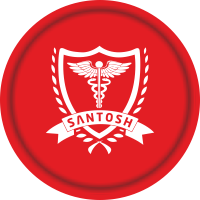Department of Oncology
Department of Oncology
The Department of Oncology at Santosh Medical College Hospital is a specialized division dedicated to providing comprehensive care for patients with cancer. Our department comprises a skilled team of oncologists and healthcare professionals who are committed to delivering personalized and advanced cancer treatment.
Our primary goal is to offer accurate and timely cancer diagnoses through state-of-the-art diagnostic techniques, including biopsies, imaging studies, and laboratory tests. This enables us to determine the type, stage, and extent of cancer, which is essential for developing effective treatment plans.
We provide a wide range of treatment options tailored to each patient's specific needs and preferences. Our treatments may include surgery, chemotherapy, radiation therapy, immunotherapy, targeted therapy, hormone therapy, or a combination of these modalities. Our oncologists work closely with patients to develop individualized treatment plans that maximize the chances of successful outcomes.
We place great emphasis on delivering compassionate care and providing support to cancer patients and their families throughout their journey. Our department offers comprehensive supportive services, including pain management, palliative care, nutritional counselling, psychosocial support, and survivorship programs. We understand the emotional and physical challenges that come with a cancer diagnosis, and we strive to provide holistic care that addresses these aspects.
Collaboration is a cornerstone of our department. Our oncologists work in close collaboration with other medical specialists, such as surgeons, radiologists, pathologists, and palliative care teams. This multidisciplinary approach ensures that patients receive comprehensive and well- coordinated care, with regular discussions in tumor boards to develop the best treatment plans for complex cases.
At Santosh Medical College Hospital's Department of Oncology, we are dedicated to providing the highest standard of cancer care. Through advanced diagnostics, personalized treatment options, supportive services, and a patient-cantered approach, we aim to improve patient outcomes, enhance quality of life, and support patients and their families throughout their cancer journey.

FAQs
Clearing your doubts
The Oncology Department plays a vital role in the diagnosis, treatment, and management of cancer. It consists of a team of specialized oncologists and healthcare professionals who work together to provide comprehensive care to patients with various types of cancer. The department focuses on accurate cancer diagnosis, personalized treatment plans, and supportive services to improve patient outcomes and quality of life.
Treatment for cancer in the Oncology Department varies depending on the type, stage, and individual patient factors. Treatment options may include surgery, chemotherapy, radiation therapy, targeted therapy, immunotherapy, hormonal therapy, or a combination of these approaches. The oncologists tailor treatment plans based on the specific needs of each patient, aiming to achieve the best possible outcomes while considering individual preferences and overall health.
The Oncology Department recognizes the importance of holistic care and provides a range of supportive services to address the physical, emotional, and psychosocial needs of patients. These services may include pain management, palliative care, nutritional counselling, psychological support, genetic counselling, survivorship programs, and access to clinical trials. The department focuses on enhancing the quality of life for patients and their families throughout the cancer journey.
While not all cancers can be prevented, there are steps you can take to reduce your risk. This includes adopting a healthy lifestyle, such as maintaining a balanced diet, engaging in regular physical activity, avoiding tobacco and excessive alcohol consumption, protecting yourself from harmful sun exposure, and following recommended screening guidelines for early detection. It's also important to be aware of family history and discuss any concerns with your healthcare provider.


.png)






